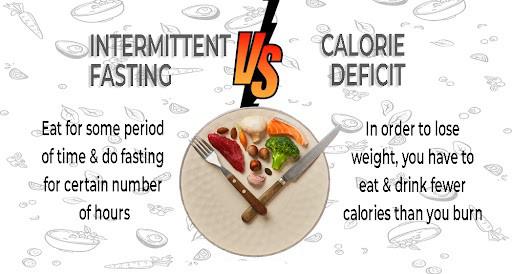Weight loss is a major health goal for many individuals, and two popular strategies—intermittent fasting (IF) and calorie counting—offer different approaches to achieving it. While intermittent fasting focuses on when you eat, calorie counting emphasizes how much you consume. This article delves into the science behind both methods, comparing their effectiveness, metabolic impact, health benefits, and challenges. Understanding these factors can help individuals choose the best approach for long-term success.

Introduction
Weight loss remains a common goal for many individuals worldwide. Among the various approaches available, intermittent fasting (IF) and calorie counting stand out as two of the most popular methods. But which one works better? This article explores the science behind both strategies, comparing their effectiveness, benefits, and challenges.
Understanding Intermittent Fasting
What is Intermittent Fasting?
Intermittent fasting is an eating pattern that alternates between periods of eating and fasting. Unlike traditional dieting, it does not specify which foods to eat but rather when to eat them. Several variations exist, each with unique benefits and challenges.
Common Types of Intermittent Fasting
- 16/8 Method: Involves fasting for 16 hours and eating within an 8-hour window.
- 5:2 Diet: Allows normal eating for five days while restricting calorie intake to about 500–600 calories for two non-consecutive days.
- Alternate-Day Fasting: Involves fasting every other day or consuming minimal calories on fasting days.
- One-Meal-a-Day (OMAD): Requires eating only one meal per day, usually within a one-hour window.
Scientific Mechanisms of Intermittent Fasting
Intermittent fasting influences the body in several ways:
- Metabolic Changes: Fasting enhances fat oxidation and promotes insulin sensitivity.
- Cellular Repair and Longevity: It triggers autophagy, a process where cells remove damaged components.
- Hormonal Shifts: Increases human growth hormone (HGH) levels and lowers insulin, aiding fat loss.
Understanding Calorie Counting
What is Calorie Counting?
Calorie counting is a method that tracks daily energy intake to ensure a caloric deficit, which leads to weight loss. Unlike intermittent fasting, it focuses on precise food intake rather than timing.
How Calorie Counting Works
- Energy Balance: Weight loss occurs when calorie expenditure exceeds calorie intake.
- Tracking Tools: Apps like MyFitnessPal and Cronometer help individuals log their daily consumption.
- Portion Control: Awareness of portion sizes helps prevent overeating.
Benefits of Calorie Counting
- Flexible Eating: Allows for a varied diet without specific food restrictions.
- Predictable Weight Loss: Provides a structured approach that can be easily modified.
- Nutrient Awareness: Encourages healthier choices by tracking macronutrients and micronutrients.
Comparing Intermittent Fasting and Calorie Counting
Intermittent Fasting (Time-Restricted Eating)
Dr. Krista Varady, Professor of Nutrition at the University of Illinois Chicago, who authored the study published in Annals of Internal Medicine, said, “Time-restricted eating, without calorie counting, has become a popular weight loss strategy because it is simple to do.” However, she noted that it’s uncertain whether this approach really helps with weight loss beyond the short term.
Her team’s study included 90 racially diverse adults with obesity from the greater Chicago area. Of these, 77 finished the entire study. Each person was given a random assignment to one of three groups: 8-hour time-restricted eating (eating between 12:00 p.m. to 8:00 p.m. daily without calorie counting), calorie restriction (calories slashed by 25%), or no changes in eating pattern. Additionally, those in the time-restricted eating group were allowed to drink no-calorie liquids outside their feeding window.
The time-restricted eating group had biweekly sessions with a dietician for 6 months while losing weight and then met monthly with a dietician for the next 6 months during a weight maintenance phase.
Calorie Counting (Calorie Restriction)
Dr. Varady’s study also examined the effectiveness of traditional calorie restriction, where participants reduced their calorie intake by 25%. It remains uncertain whether time-restricted eating is more effective than traditional calorie counting for long-term weight loss.
The calorie restriction group, like the intermittent fasting group, had biweekly sessions with a dietician for 6 months during the weight loss phase and then met monthly for 6 months during the maintenance phase.
All groups, including those following calorie counting, received measurements at the onset of the study, at the 6-month mark, and at 12 months. Participants were also asked not to change their activity level or add exercise to their routine.

Health Benefits Beyond Weight Loss
Both methods offer health benefits beyond shedding pounds.
Intermittent Fasting
- Improves insulin sensitivity and lowers blood sugar levels.
- Reduces inflammation and oxidative stress.
- May support brain health and longevity.
Calorie Counting
- Helps prevent overconsumption of processed foods.
- Supports balanced nutrition when done correctly.
- Encourages mindful eating habits.
Psychological and Behavioral Considerations
- Intermittent Fasting: May reduce food obsession by limiting eating windows.
- Calorie Counting: Can lead to stress if overly restrictive or obsessive.
Potential Challenges
Difficulties with Intermittent Fasting
- Hunger and energy dips during fasting periods.
- Social challenges due to restricted eating windows.
- Potential overeating during eating periods.
Challenges of Calorie Counting
- Requires consistent tracking and food measurement.
- Can lead to obsessive behaviors in some individuals.
- Does not inherently focus on food quality.
Which One Should You Choose?
The best approach depends on individual preferences, lifestyle, and goals. Those who prefer structured control may benefit from calorie counting, while individuals looking for flexibility might find intermittent fasting more sustainable.
Take care of your body. It’s the only place you have to live.
Jim Rohn
Conclusion
Both intermittent fasting and calorie counting offer unique benefits for weight loss and overall health. The choice between them depends on personal lifestyle, habits, and long-term adherence. Understanding their mechanisms and challenges allows for a more informed decision, leading to sustainable results.
